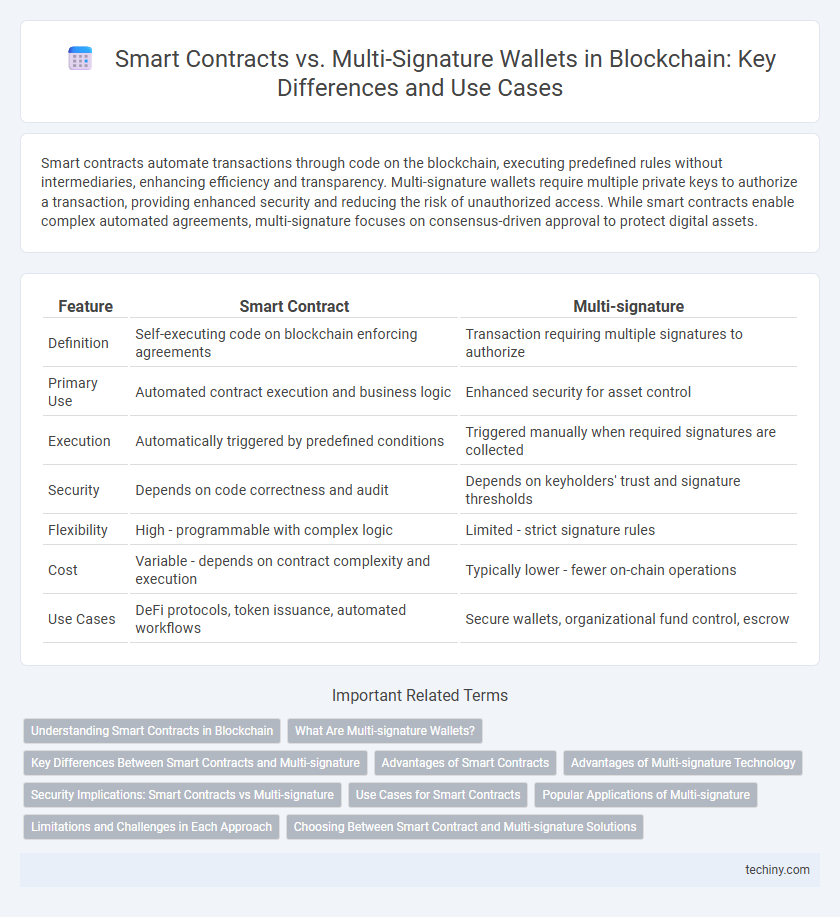Smart contracts automate transactions through code on the blockchain, executing predefined rules without intermediaries, enhancing efficiency and transparency. Multi-signature wallets require multiple private keys to authorize a transaction, providing enhanced security and reducing the risk of unauthorized access. While smart contracts enable complex automated agreements, multi-signature focuses on consensus-driven approval to protect digital assets.
Table of Comparison
| Feature | Smart Contract | Multi-signature |
|---|---|---|
| Definition | Self-executing code on blockchain enforcing agreements | Transaction requiring multiple signatures to authorize |
| Primary Use | Automated contract execution and business logic | Enhanced security for asset control |
| Execution | Automatically triggered by predefined conditions | Triggered manually when required signatures are collected |
| Security | Depends on code correctness and audit | Depends on keyholders' trust and signature thresholds |
| Flexibility | High - programmable with complex logic | Limited - strict signature rules |
| Cost | Variable - depends on contract complexity and execution | Typically lower - fewer on-chain operations |
| Use Cases | DeFi protocols, token issuance, automated workflows | Secure wallets, organizational fund control, escrow |
Understanding Smart Contracts in Blockchain
Smart contracts in blockchain are self-executing code that automatically enforces agreements when predefined conditions are met, eliminating the need for intermediaries. Unlike multi-signature wallets that require multiple approvals to authorize transactions, smart contracts enable complex logic and automation, securing transparent and trustless execution. Their programmability supports various use cases, from decentralized finance to supply chain management, enhancing blockchain's utility and efficiency.
What Are Multi-signature Wallets?
Multi-signature wallets require multiple private keys to authorize a blockchain transaction, enhancing security by distributing control among several participants. These wallets prevent unauthorized access and reduce the risk of single-point failures compared to traditional single-key wallets. They are commonly used in business environments and decentralized organizations to ensure that fund transfers or contract executions happen only with consensus.
Key Differences Between Smart Contracts and Multi-signature
Smart contracts are self-executing code stored on a blockchain that automatically enforces and validates terms based on predefined conditions. Multi-signature wallets require multiple private keys to authorize a single transaction, providing enhanced security through collective approval. Unlike multi-signature setups, smart contracts enable complex programmable logic beyond simple transaction authorization, allowing automation of various decentralized applications.
Advantages of Smart Contracts
Smart contracts automate transactions on blockchain by executing pre-defined rules without intermediaries, reducing errors and enhancing security. They enable faster processing and complex conditional logic, which multi-signature wallets lack. The self-executing nature of smart contracts increases transparency and trust in decentralized applications.
Advantages of Multi-signature Technology
Multi-signature technology enhances blockchain security by requiring multiple private keys to authorize transactions, significantly reducing the risk of unauthorized access or fraud. It facilitates decentralized control, ensuring no single party can unilaterally move funds, which is critical for organizational wallets and collaborative projects. This trustless approach improves transaction transparency and accountability, making multi-signature wallets a robust solution for safeguarding digital assets.
Security Implications: Smart Contracts vs Multi-signature
Smart contracts automate transactions on blockchain networks with predefined rules, offering efficiency but exposing users to risks from coding vulnerabilities and exploits. Multi-signature wallets require multiple private keys to authorize transactions, enhancing security by reducing single points of failure and preventing unauthorized access. Comparing the two, multi-signature provides robust protection against hacking and fraud, while smart contracts offer flexibility but demand rigorous security audits to mitigate potential flaws.
Use Cases for Smart Contracts
Smart contracts enable automated, self-executing agreements on the blockchain, ideal for complex transactions like decentralized finance (DeFi), supply chain management, and tokenized asset exchanges. They reduce reliance on intermediaries by enforcing predefined rules and conditions, ensuring transparency and trust. Use cases include automated loan approvals, real-time royalty distribution, and conditional payments based on verified events.
Popular Applications of Multi-signature
Multi-signature wallets enhance blockchain security by requiring multiple private keys to authorize transactions, making them essential for cryptocurrency exchanges, decentralized finance platforms, and corporate treasury management. Popular applications include safeguarding funds in decentralized autonomous organizations (DAOs) where multiple stakeholders must approve spending, and enabling joint account management to prevent unauthorized access. This multi-party control mechanism increases transparency and reduces the risk of fraud compared to traditional single-signature smart contracts.
Limitations and Challenges in Each Approach
Smart contracts face limitations including code vulnerabilities, lack of flexibility once deployed, and challenges with legal enforceability across jurisdictions. Multi-signature wallets provide enhanced security through shared control but encounter challenges such as complex coordination among signers, slower transaction execution, and potential for user errors in key management. Both approaches require rigorous audit processes and clear governance models to mitigate operational risks and ensure trustworthiness in blockchain applications.
Choosing Between Smart Contract and Multi-signature Solutions
Smart contracts offer automated, programmable execution of agreements on the blockchain, enabling complex workflows without intermediaries. Multi-signature solutions enhance security by requiring multiple private keys to authorize transactions, reducing the risk of unauthorized access. Choosing between the two depends on the need for automation and conditional logic in smart contracts versus the simpler, robust security model provided by multi-signature wallets for transaction approvals.
Smart Contract vs Multi-signature Infographic

 techiny.com
techiny.com